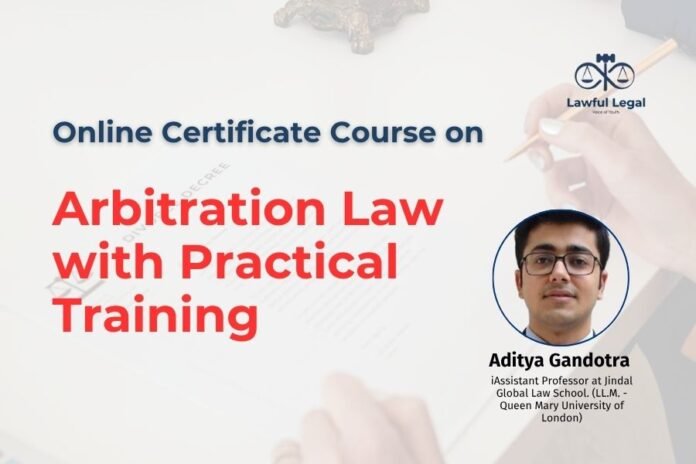About Lawful Legal
Lawful Legal is committed to bridging the gap between complex legal concepts and the general public. Lawful Legal publishes blogs, infographics, research articles, case commentaries, and more to make the law accessible. Their quarterly journals bring together academic excellence from various universities, creating a space for erudite discussions.
About the Course
This comprehensive 6-week Advanced certificate course is designed to provide law students, legal professionals, and aspiring arbitrators with in-depth knowledge and practical skills in arbitration. Covering both domestic and international perspectives, the course delves into the legal framework, core concepts, recent case law, and hands-on drafting exercises.
About Mentor
Aditya Gandotra is an Assistant Professor at Jindal Global Law School, O.P. Jindal Global University, India. Aditya holds an LL.M. in Comparative and International Dispute Resolution from Queen Mary University of London with distinction in International Construction Contracts and Dissertation.
Eligibility
Law students (including LLM students), graduates, faculty and practitioners.
Mode
Online, live sessions via Microsoft Teams (Recordings will also be provided)
Course Modules
Week 1: Introduction to Arbitration and Legal Framework
Session 1: Understanding Arbitration in India & Globally
- Historical evolution and concept of arbitration
- Types of arbitration: Domestic, International Commercial, Ad Hoc, and Institutional
- Advantages and disadvantages of arbitration
Session 2: Legal Framework in India
- Arbitration and Conciliation Act, 1996 (as amended)
- Key definitions: Arbitration agreement, seat vs. venue
- Role of the UNCITRAL Model Law
- Overview of latest amendments and landmark case laws (2019 & 2021)
- Practical Element: Drafting a basic arbitration clause
Week 2: Arbitration Agreement and Jurisdiction
Session 3: Essentials of a Valid Arbitration Agreement
- Section 7 and important judicial interpretations
- Doctrine of separability and kompetenz-kompetenz
- Multi-tiered dispute resolution clauses
Session 4: Jurisdiction & Judicial Intervention
- Sections 5, 8 & 11: Reference to arbitration, appointment of arbitrators, and minimal court intervention
- Section 9: Interim reliefs by courts
- Key case law: Vidya Drolia v. Durga Trading
- Practical Element: Case Study Analysis: Validity of an arbitration clause
Week 3: Arbitral Proceedings and Evidence
Session 5: Composition and Powers of the Arbitral Tribunal
- Number and appointment of arbitrators
- Challenges to appointment: Bias, independence – Section 12 & Fifth Schedule
- Section 29A: Time limits and procedural efficiency
Session 6: Conduct of Proceedings & Taking Evidence
- Sections 18–27: Procedural rules, submission of evidence, oral hearings
- Use of technology and virtual arbitration
- CIArb Guidelines & IBA Rules on Evidence
- Practical Element: Drafting of notices and pleadings in arbitration
Week 4: Interim Measures, Costs & Settlement
Session 7: Interim Measures by Tribunal & Courts
- Section 17 vs. Section 9 – Powers of the tribunal and courts
- Emergency arbitration in India: Case study of Amazon v. Future Retail
- Strategic considerations in seeking interim relief
Session 8: Costs, Settlement & Hybrid Mechanisms
- Section 31A: Cost regimes and post-2015 developments
- Consent awards and enforceability
- Med-Arb and Arb-Med mechanisms: Pros and cons
- Practical Element: Drafting a cost schedule and an interim application
Week 5: Arbitral Award and Enforcement
Session 9: Making and Drafting an Arbitral Award
- Types of awards: Interim, Partial, Final
- Essentials under Section 31
- Reasoned awards and adherence to principles of natural justice
Session 10: Enforcement and Challenge of Awards
- Enforcement of domestic awards: Section 36
- Setting aside awards under Section 34
- Public policy ground and judicial trends post-2015
- Landmark judgments and analysis
- Practical Element: Drafting an arbitral award and an outline of a challenge petition
Week 6: International Arbitration and Career in Arbitration
Session 11: International Commercial Arbitration (ICA)
- Definition under Section 2(1)(f)
- Enforcement under the New York Convention (Sections 44–52)
- Leading arbitral institutions: SIAC, LCIA, ICC, MCIA
- India’s emerging role as an international arbitration hub
Session 12: Career Pathways, Ethics, and Soft Skills
- How to become an arbitrator: Qualifications and registrations
- Arbitrator’s Code of Conduct and ethical obligations
- Soft skills for arbitration professionals: Communication, neutrality, decision-making
Additional Benefits
- Weekend Sessions ONLY and manageable with practice, job, college internship, exams etc.
- Practical Training
- E-Certificate: On successful completion of the course
- Access to recordings.
- 10000+ Editable Legal Drafts
Duration & Class Timings
The course begins on 7th June 2025 and will go on for 6 weeks, featuring engaging live classes held two times a week.
Class Schedule:
Days: Saturday & Sunday (weekend Classes only)
Timings: 8:00 PM – 9:30 PM (Evening Sessions)
Last Date to Enrol
05 June
Course Fees
- For students: Rs 1000
- For professionals: Rs 1999
Enrolment Procedure
Click Here to Enrol.
Attention all law students!
Are you tired of missing out on internship, job opportunities and law notes?
Well, fear no more! With 1+ lakhs students already on board, you don’t want to be left behind. Be a part of the biggest legal community around!
Join our WhatsApp Groups (Click Here) and Telegram Channel (Click Here) and get instant notifications.
Note: LawBhoomi will only provide support for courses that you register for through the links on our platform. Registrations made through other links are not eligible for support. For any assistance, write to: [email protected]


